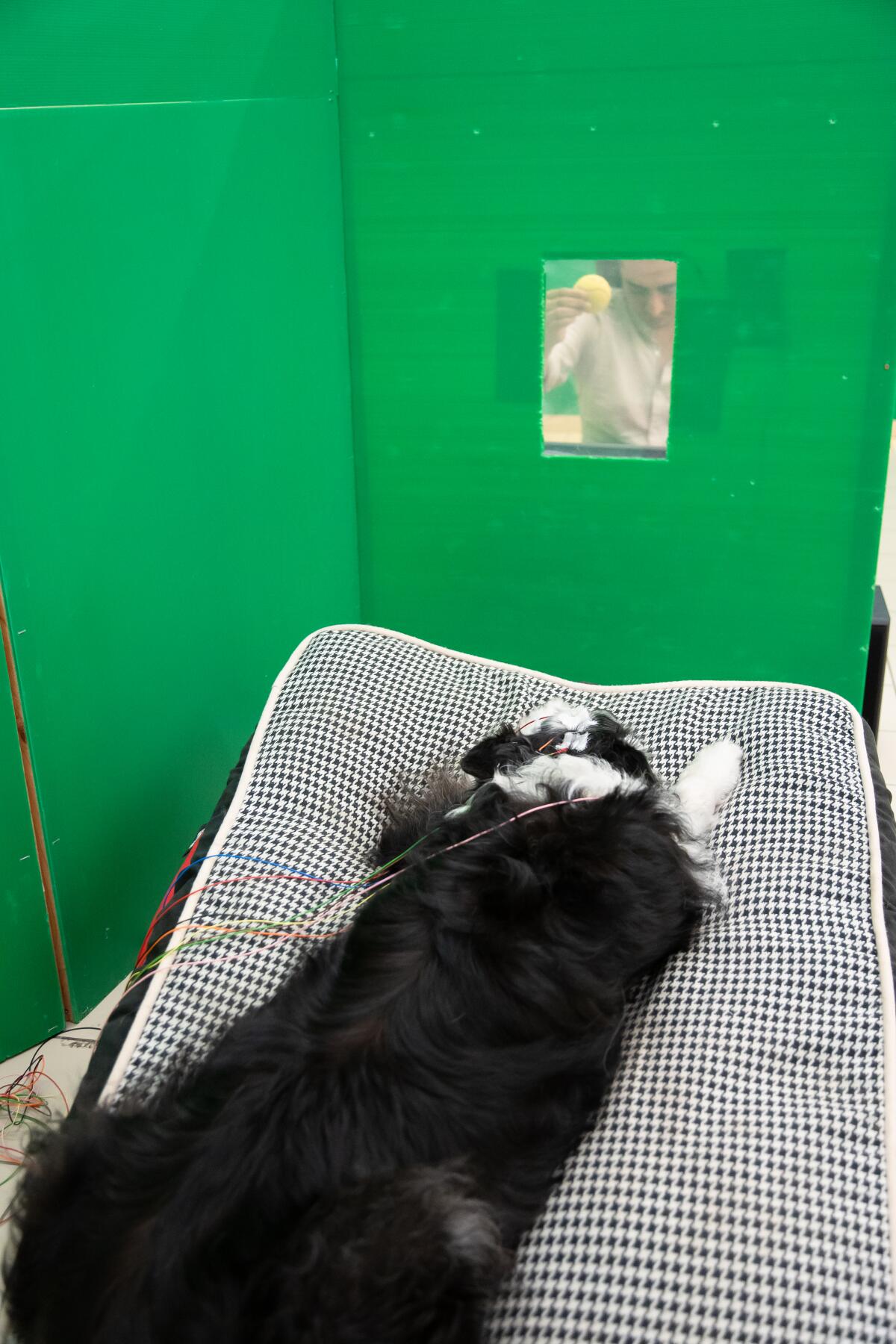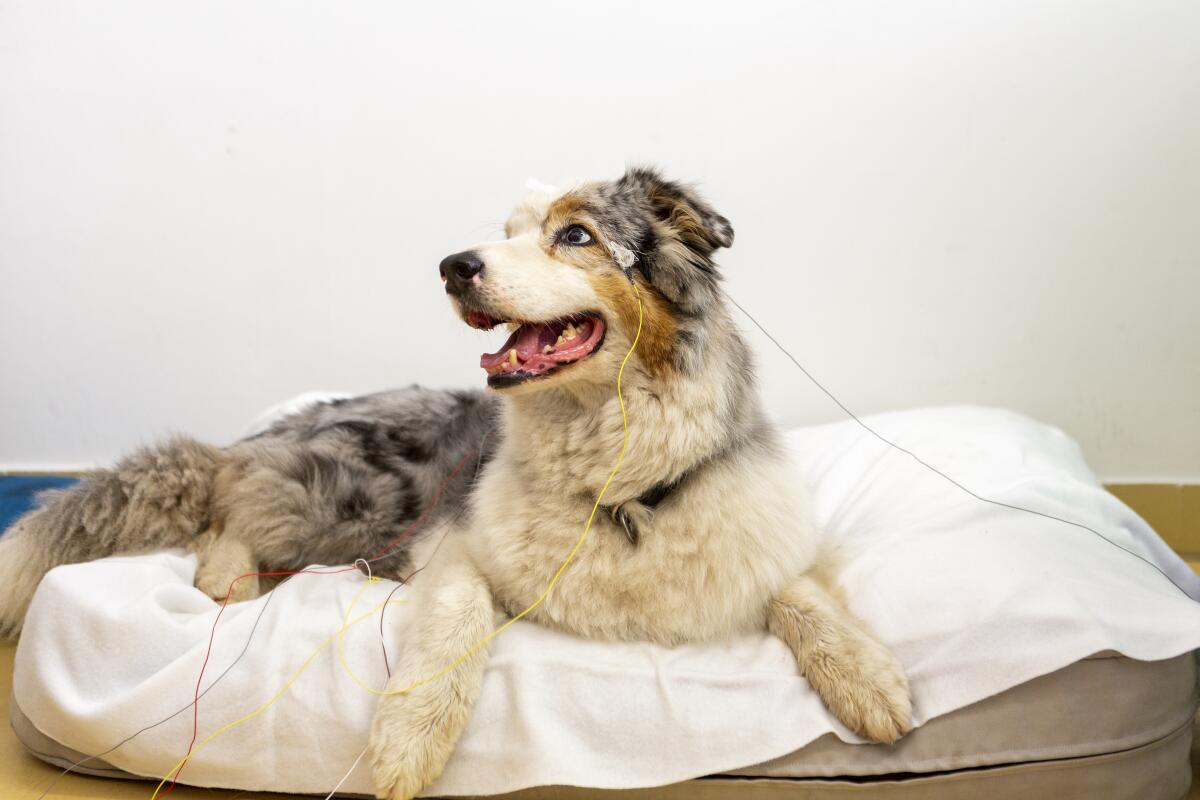
Our dogs understand us better than they're given credit for – and scientists say they have the brainwave evidence to prove it.
By placing electrodes on the heads of eighteen dogs, researchers found striking evidence that the animals not only recognized the sound patterns that come from the mouths of their owners but also realized that certain words refer to specific objects.
The findings were reported Friday in the journal Current Biology.
“There has been debate for decades about whether animals are capable of such a level of abstraction,” says study leader Marianne Borosa neuroscientist and ethologist at Eotvos Lorand University in Budapest, Hungary. The experiments with dogs undermine the uniqueness of humans 'a little bit'.
A few exceptional dogs have been trained to learn the names of hundreds of objects. One of the most appreciated was Huntera border collie from South Carolina who could remember the names of more than 1,000 toys.
Boros wondered if more dogs understand that words have meaning, but cannot show it. Even when dogs succeed in behavioral studies, she said, “you never know exactly what's going on in the brain.”
So she took inspiration from researchers who study language processing in humans and got a electroencephalogram machine. The EEG measures brain waves and can measure the difference between the neural responses to an expected word and a word that seems to come from left field.
Arbó rests with owner Júlia Vanda Dénes before taking a vocabulary test. The greyhound wears electrodes that measure brain activity during the experiment.
(Oszkár Dániel Gáti)
Using a little detergent, some conductive cream and gauze, the researchers attached the EEG electrodes to the heads of 27 dogs. The dogs then listened to recordings of their owners using familiar words in simple sentences, such as “Luna, here's the ball.”
After a short pause, the owner appeared behind a window with an object in hand. Sometimes it was the object mentioned in the sentence; sometimes that was not the case. Either way, the electrodes recorded small voltages from the dogs' brains as they thought about what they had heard and seen.
The testing continued as long as a dog was willing to stay on the mat and participate, Boros said.
“The EEG studies with dogs are quite easy to perform,” she said. “They don't have to do anything. They just lay down.”
The 18 dogs that could pass at least 10 trials were included in the analysis. In all but four animals, the EEGs showed a clear pattern: the wave signals dropped significantly lower when there was a match between the word and the object than when there was not.

Kun-Kun watches through a window as its owner holds up a tennis ball during the experiment.
(Oszkár Dániel Gáti)
It was reminiscent of the difference seen in EEGs when people are confronted with a word that seems out of place, such as a request to wash your hands with soap and coffee. Neuroscientists interpret this as a sign that the brain had expected a different word – 'water' instead of 'coffee' – and had to do some extra work to understand the sentence.
Boros and her colleagues propose that the same thing happens in dogs' brains: After hearing their owner use the word for an object, they called it up in their heads in anticipation of seeing it. Then when an object appeared, it was either something they expected or something that confused them. The reason the dogs could tell something was wrong was because they understood the spoken word.
The gap between hearing the word and seeing the object is crucial, he said Lilla Magyaria cognitive neuroscientist at the University of Stavanger in Norway, who worked on the study.
If a dog heard the word “ball” while looking at a ball in its owner's hands, it might suspect that the two go together because they are present at the same time, she said. But the design of the experiment prevented this from happening. Instead, the dog must have created an accurate mental representation of the spoken word.
The dog thought: “I have heard the word, now the object must come,” said Magyari.
'Ball' was the most common vocabulary word among the dogs in the study. Several had words for “belt,” “phone,” and “wallet.” Most had at least one name for their favorite toy, including one pet who understood four different words for different toys in the experiment.

Joey sits on a mat before participating in a word knowledge experiment.
(Grzegorz Eliasiewicz)
It is not clear from the research results whether all dogs have the ability to learn words. Those who took part in the experiment were volunteered by their owners, who guaranteed that their pets knew at least five words for objects. (One dog was said to have a vocabulary of 230 nouns.)
Marie Nitzschner has studied the cognitive and communication skills of dogs for ten years at the Max Planck Institute for Evolutionary Anthropology in Germany. She said she had only ever met one dog who seemed to know words for specific objects. Still, she says the study provides strong evidence that the phenomenon is real.
“It seems decisive to me,” said Nitzschner, who was not involved in the work.
She added that dogs that don't have this ability have nothing to worry about “because we still have good communication capabilities. However, if I noticed that my dog had a talent in this direction, I would probably try to encourage this talent.”
Dog lovers are sure to be intrigued by the linguistic abilities of their best friends. But the researchers see the study as a way to investigate why humans excel at language and other animals do not.
“It's a bit of a mystery,” Magyari said. “We don't know why people were suddenly able to use such a complex system.”
By breaking it down into its component parts and studying whether any of these parts are shared with animals, “we can construct a theory of how language evolved in humans,” she said.
Of all the species on earth, dogs are special test subjects because they live their entire lives immersed in a world rich in human speech. And unlike cats, dogs' ancestors were selected for domestication based on their ability to communicate with humans.
“It's super relevant to them,” Boros said.













